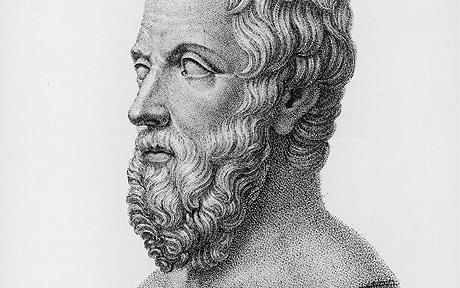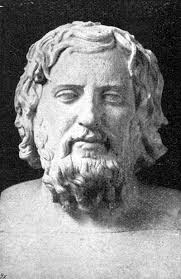By Francesca Leaf
Over the centuries, civilizations have endeavored to preserve a record of their existence for future generations. This effort has taken the form of compiling chronologies, building monuments, and creating art.
The ancient Greeks took it a step further.
They invented an entirely new literary genre, solely dedicated to recounting important events in narrative form for the benefit of posterity—history. Among the ancient Greek historians who created and defined the genre are Herodotus, Thucydides, and Xenophon.
1. HERODOTUS (C. 484–425 BCE): THE FATHER OF HISTORY
“I am bound to tell what I am told, but not in every case to believe it.”—Herodotus, The Histories
Dubbed “The Father of History” by Cicero, Herodotus is arguably the first writer to narrate a series of events of global importance and recount them in relations of cause and effect. In The Histories, Herodotus examines the Greco-Persian Wars, the rise and rule of the Persian Empire, and the history and cultural background of Scythia and Egypt.
Before he was the father of history, Herodotus was a globe trotter. He traveled throughout the Persian Empire, which at the time extended into Egypt. Herodotus was profoundly interested in the people he met; their customs, worldviews, and achievements. He listened to their stories, heard their myths, and collected their narratives.
In between trips, Herodotus returned to Athens, where at gatherings, large and small, he recounted his travels. The combination of his novel tales and delightful storytelling made him wildly popular.
Herodotus later wove his stories and knowledge together, creating his masterpiece: The Histories. An engaging read, the series of events is interspersed with interventions from the gods, fables, and small stories often reminiscent of tall tales. To Herodotus, legends and cultural memory held just as a significant place in history as wars and politics.
Overall, Herodotus has opened a window into the values and worldviews of ancient Greece. I think that Reginald Macan put it best, stating:
“There is, indeed, no ancient historian, whether upon his own ground or on general grounds, with whom Herodotus need fear comparison. . . . in the larger view of history, which embraces every experience of humanity [and] treats no aspect of human life as common or unclean . . . Herodotus keeps his rank as the premier historian of antiquity.”
2. THUCYDIDES (C. 460–395 BCE): THE SCIENTIFIC HISTORIAN
“I have written my work, not as an essay which is to win the applause of the moment, but as a possession for all time.”—Thucydides, History of the Peloponnesian War
Best known for his History of the Peloponnesian War, Thucydides is recognized by many as the father of scientific history. Written at the time of the conflict, Thucydides based this work on eyewitness accounts, interviews, and records.
Unlike Herodotus, however, he generally interpreted significant events as having human, not divine, causes. Thucydides’ concise prose, adherence to chronology, and exploration of timeless themes such as ethics, leadership, and nationalism, has won him admirers across the centuries.
It is believed that the father of scientific history was born in the Athenian suburb of Halimos, c. 460 BCE. During Thucydides’ time, democratic Athens was a prominent sea power, but to the south, one would find the Peloponnese, home to militaristic Sparta and its mighty land force. Thucydides would later argue that fear of Athens’ ever-growing influence motivated Sparta’s attack.
During the war, Thucydides’ defining moment came in 424 BCE when he was blamed for losing the city of Amphipolis to Sparta. Believing he would be condemned to death, he fled to his Thracian estate.
While in exile, Thucydides found himself in a unique situation. He was privy to accounts of the war from both sides.
Later he would write, “It was . . . my fate to be an exile from my country for 20 years after my command at Amphipolis; and being present with both parties, and more especially with the Peloponnesians by reason of my exile, I had leisure to observe affairs somewhat particularly.”
And thus he began to write The History of the Peloponnesian War. In total, he chronicled nearly 30 years of conflict.
While there is no record of Thucydides’ contemporaries admiring his work, over the centuries he became regarded as a great historian. Several copies of his History were made, securing its survival through the ages. His keen analysis of the human condition has influenced notable philosophers, including Thomas Hobbes, Francis Bacon, and Friedrich Nietzsche.
3. XENOPHON (C. 430–354 BCE): THE ATTIC MUSE
“There is small risk a general will be regarded with contempt by those he leads, if, whatever he may have to preach, he shows himself best able to perform.”—Xenophon, The Cavalry General
A man of many talents, Xenophon distinguished himself as a soldier, historian, and memoirist. He wrote beautifully on a multitude of topics, his prose earning him the nickname of “Attic Muse.”

Xenophon was born during the tumult of the Peloponnesian War, in Erchia—just an hour’s journey from Athens. A member of the equestrian class, Xenophon received a solid education and military training.
Xenophon put his military training to use in 401 BCE when he and his friend volunteered to serve as mercenary soldiers. They believed that they would be lending their skills to a Persian governor whose territory was under threat… but this was not the case. Instead, they found themselves involved in a veritable game of thrones, aiding Cyrus the Younger in an assault on the Persian king, Artaxerxes II.
However, early on Cyrus the Younger was killed and his generals were subsequently executed.
Xenophon and the other soldiers found themselves stranded in hostile territory, haunted by dark thoughts and filled with despair. The situation was dire.
Fortunately for those involved, Xenophon displayed great courage and was elected leader of the 10,000-man army. He successfully led them to safety, enduring nearly ceaseless battle, dwindling supplies, and snowstorms along the way. Xenophon later recorded his harrowing tale in Anabasis, which has inspired countless similar works throughout the centuries.
A LASTING LEGACY
For ancient Greek historians, writing history entailed both recording events of note and creating works of literary merit. Engaging with their works is an opportunity to learn about the past, gain insight into ancient Greek culture, and read masterful prose… and hopefully not repeat any of their mistakes.












One comment
Thanks for an excellent article. A clear and nicely organized introduction like this motivate us to want to learn more about the classics.
Our apologies, you must be logged in to post a comment.